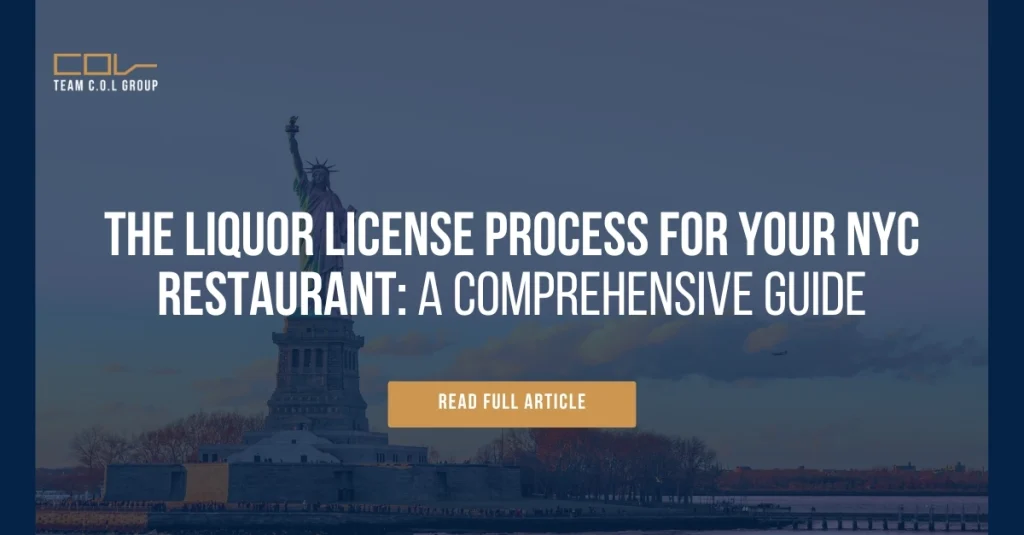Opening a restaurant in the city that never sleeps is an exciting venture. To elevate your establishment’s appeal, offering alcoholic beverages can be a game-changer. However, obtaining a liquor license in New York City (NYC) involves navigating specific regulations and procedures. At Team Col Group, we’re here to guide you through this process seamlessly.
1. Familiarize Yourself with New York State Liquor Laws
The New York State Liquor Authority (SLA) oversees the issuance of liquor licenses. Understanding their regulations is crucial:
- License Availability: New York operates under a quota system, limiting the number of available licenses.
- License Types: Determine whether you need an on-premises license (for serving alcohol within your establishment) or an off-premises license (for selling alcohol to-go).
- Zoning Laws: Ensure your chosen location complies with local zoning laws, especially concerning proximity to schools and places of worship.
For detailed information, visit the New York State Liquor Authority’s official website.
2. Select the Appropriate Liquor License
In NYC, common licenses include:
- On-Premises Liquor License: Ideal for restaurants and bars where alcohol is consumed on-site.
- Restaurant Wine License: Allows the sale of wine and beer for on-premises consumption.
- Catering Establishment License: For businesses providing alcohol at catered events.
Each license has specific requirements and privileges. It’s essential to choose the one that aligns with your business model.
3. Prepare and Submit Your Application
The application process involves:
- Business Documentation: Include your Certificate of Authority, proof of incorporation, and a valid Employer Identification Number (EIN).
- Financial Disclosures: Provide financial statements and tax returns.
- Premises Information: Submit floor plans, lease agreements, and evidence of premises control.
- Community Board Consultation: In NYC, it’s customary to present your plans to the local Community Board, as their approval can influence the SLA’s decision.
Ensure all information is accurate and complete to avoid delays. The SLA provides a comprehensive checklist to assist applicants.
4. Budget for Fees and Anticipate Timelines
Financial planning is vital:
- Application Fees: Fees vary based on license type and location. Refer to the SLA’s fee chart for specifics.
- Processing Time: The SLA’s review process typically takes 22-26 weeks. However, many applicants are eligible for a temporary retail operating permit, allowing operations to commence in less than 30 days. (sla.ny.gov)
5. Maintain Compliance and Train Your Staff
Once licensed:
- Staff Training: Enroll your team in the Alcohol Training Awareness Program (ATAP) to promote responsible service. Certification can be beneficial during SLA inspections. (gettips.com)
- Operational Adherence: Comply with all state and local regulations, including hours of operation and record-keeping.
- Community Engagement: Maintain a positive relationship with your local Community Board and neighborhood to foster goodwill.
Partner with Team Col Group for a Smooth Licensing Experience
You don’t have to go it alone. At Team Col Group, we specialize in assisting restaurants through the liquor licensing process, ensuring you meet all state and city requirements efficiently.
Ready to get started? Contact us today to learn how we can help your restaurant thrive in the Big Apple.




